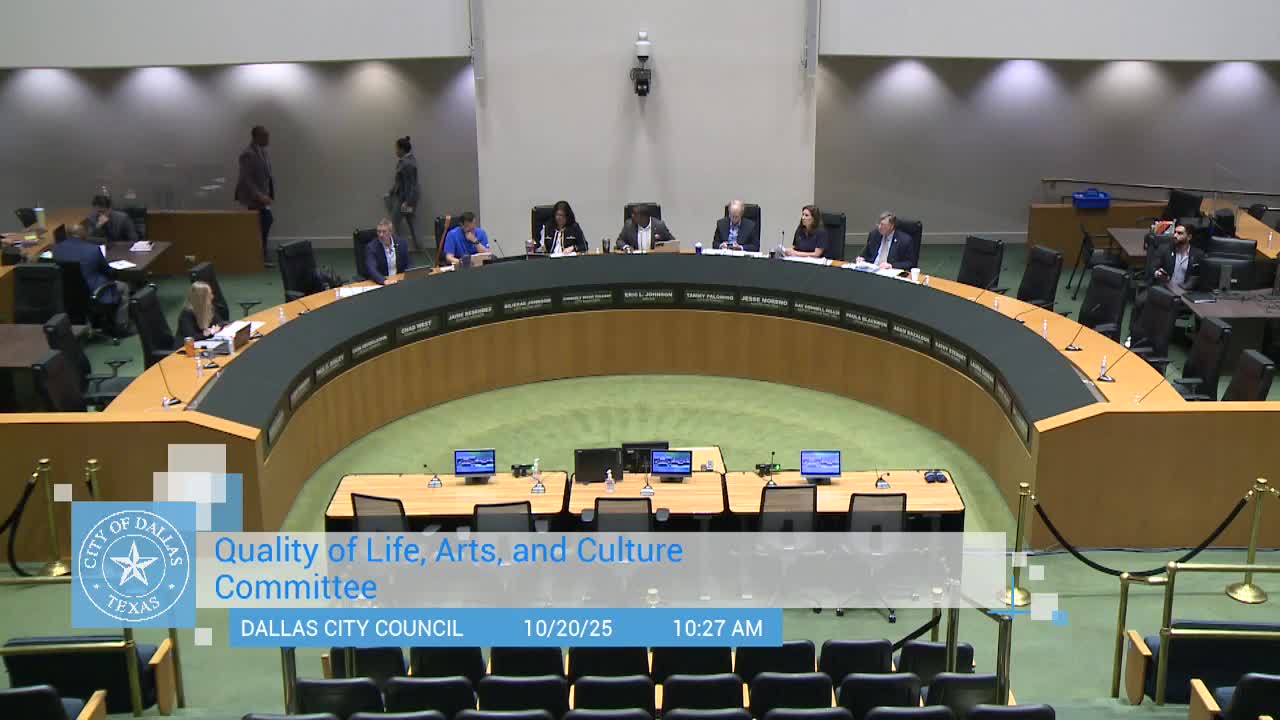Dallas committee weighs code changes on noise, lighting and valet parking but keeps review at committee level
October 20, 2025 | Dallas, Dallas County, Texas
This article was created by AI summarizing key points discussed. AI makes mistakes, so for full details and context, please refer to the video of the full meeting. Please report any errors so we can fix them. Report an error »

City code officials presented an update Oct. 20 on possible ordinance amendments targeting "extraordinary neighborhood events" — private gatherings or displays that generate sustained noise, lighting, parking and congestion problems.
Staff framed the issue as enforcement gaps across zoning, noise, lighting and parking provisions. Andrea Uddra of Planning and Development said the team is considering clarifying accessory‑use language to prohibit commercial events in single‑family districts. Jeremy Reid of Code Compliance recommended exploring a nuisance definition for "excessive illumination" and suggested an objective threshold in residential zones in the range of 0.3–0.5 foot‑candles measured at the property line to guide enforcement.
Major Polly Ashford of Dallas Police Department described operational steps to improve enforcement, including improved 311 workflows and a planned prosecutorial training to strengthen noise‑violation evidence procedures. Ashford also said repeat complaints would trigger notices that could escalate to habitual‑nuisance designation under Chapter 27 of the City Code if criminal citations are obtained.
Transportation and Public Works staff noted valet operations at private residences and spillover parking currently lack clear regulation; the department suggested staff research possible limits (for example, a capped number of events per year for a single property) and return proposed language.
A motion by Deputy Mayor Pro Tem Danielle Willis to send the item to full council for a citywide briefing was seconded and debated. Several councilmembers urged caution, saying the topic risks unintended consequences — for example, curbing legitimate neighborhood events or creating tools that could be weaponized in neighbor disputes. Others stressed the need to address extreme, sustained nuisances and noted an expected rise in cases during major events such as the World Cup.
After discussion the committee voted to keep further drafting and vetting at committee level. Staff were asked to prepare draft ordinance language, consult with the city attorney and municipal courts on enforcement thresholds, gather citywide data (311, DPD calls, code‑compliance complaints) broken down by district, and return to the committee on Nov. 17 with proposed language and data to inform next steps.
What happens next: staff will research definitions, draft ordinance text for noise, light and valet/parking issues, gather data on complaints across council districts, consult the city attorney and municipal courts on evidence thresholds and return to committee on Nov. 17 for further review.
Staff framed the issue as enforcement gaps across zoning, noise, lighting and parking provisions. Andrea Uddra of Planning and Development said the team is considering clarifying accessory‑use language to prohibit commercial events in single‑family districts. Jeremy Reid of Code Compliance recommended exploring a nuisance definition for "excessive illumination" and suggested an objective threshold in residential zones in the range of 0.3–0.5 foot‑candles measured at the property line to guide enforcement.
Major Polly Ashford of Dallas Police Department described operational steps to improve enforcement, including improved 311 workflows and a planned prosecutorial training to strengthen noise‑violation evidence procedures. Ashford also said repeat complaints would trigger notices that could escalate to habitual‑nuisance designation under Chapter 27 of the City Code if criminal citations are obtained.
Transportation and Public Works staff noted valet operations at private residences and spillover parking currently lack clear regulation; the department suggested staff research possible limits (for example, a capped number of events per year for a single property) and return proposed language.
A motion by Deputy Mayor Pro Tem Danielle Willis to send the item to full council for a citywide briefing was seconded and debated. Several councilmembers urged caution, saying the topic risks unintended consequences — for example, curbing legitimate neighborhood events or creating tools that could be weaponized in neighbor disputes. Others stressed the need to address extreme, sustained nuisances and noted an expected rise in cases during major events such as the World Cup.
After discussion the committee voted to keep further drafting and vetting at committee level. Staff were asked to prepare draft ordinance language, consult with the city attorney and municipal courts on enforcement thresholds, gather citywide data (311, DPD calls, code‑compliance complaints) broken down by district, and return to the committee on Nov. 17 with proposed language and data to inform next steps.
What happens next: staff will research definitions, draft ordinance text for noise, light and valet/parking issues, gather data on complaints across council districts, consult the city attorney and municipal courts on evidence thresholds and return to committee on Nov. 17 for further review.
View full meeting
This article is based on a recent meeting—watch the full video and explore the complete transcript for deeper insights into the discussion.
View full meeting
